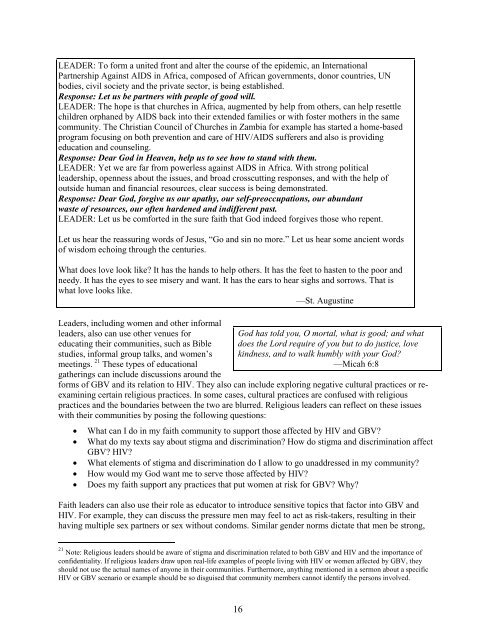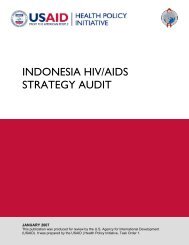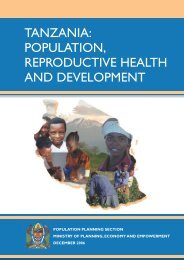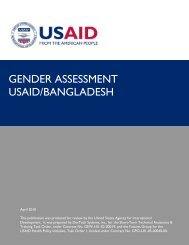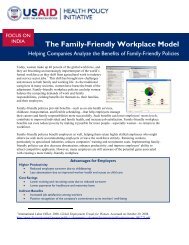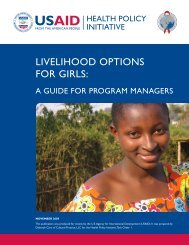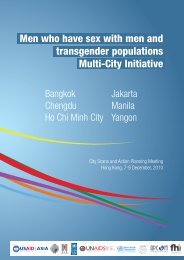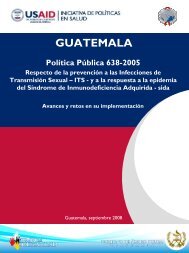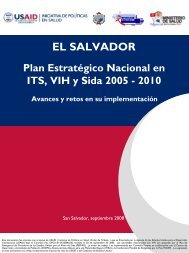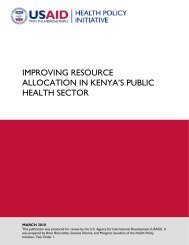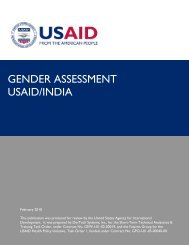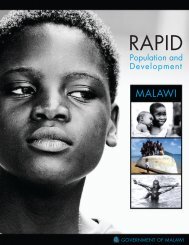A Call to Act - Health Policy Initiative
A Call to Act - Health Policy Initiative
A Call to Act - Health Policy Initiative
Create successful ePaper yourself
Turn your PDF publications into a flip-book with our unique Google optimized e-Paper software.
LEADER: To form a united front and alter the course of the epidemic, an International<br />
Partnership Against AIDS in Africa, composed of African governments, donor countries, UN<br />
bodies, civil society and the private sec<strong>to</strong>r, is being established.<br />
Response: Let us be partners with people of good will.<br />
LEADER: The hope is that churches in Africa, augmented by help from others, can help resettle<br />
children orphaned by AIDS back in<strong>to</strong> their extended families or with foster mothers in the same<br />
community. The Christian Council of Churches in Zambia for example has started a home-based<br />
program focusing on both prevention and care of HIV/AIDS sufferers and also is providing<br />
education and counseling.<br />
Response: Dear God in Heaven, help us <strong>to</strong> see how <strong>to</strong> stand with them.<br />
LEADER: Yet we are far from powerless against AIDS in Africa. With strong political<br />
leadership, openness about the issues, and broad crosscutting responses, and with the help of<br />
outside human and financial resources, clear success is being demonstrated.<br />
Response: Dear God, forgive us our apathy, our self-preoccupations, our abundant<br />
waste of resources, our often hardened and indifferent past.<br />
LEADER: Let us be comforted in the sure faith that God indeed forgives those who repent.<br />
Let us hear the reassuring words of Jesus, “Go and sin no more.” Let us hear some ancient words<br />
of wisdom echoing through the centuries.<br />
What does love look like? It has the hands <strong>to</strong> help others. It has the feet <strong>to</strong> hasten <strong>to</strong> the poor and<br />
needy. It has the eyes <strong>to</strong> see misery and want. It has the ears <strong>to</strong> hear sighs and sorrows. That is<br />
what love looks like.<br />
—St. Augustine<br />
Leaders, including women and other informal<br />
leaders, also can use other venues for<br />
God has <strong>to</strong>ld you, O mortal, what is good; and what<br />
educating their communities, such as Bible does the Lord require of you but <strong>to</strong> do justice, love<br />
studies, informal group talks, and women’s kindness, and <strong>to</strong> walk humbly with your God?<br />
meetings. 21 These types of educational —Micah 6:8<br />
gatherings can include discussions around the<br />
forms of GBV and its relation <strong>to</strong> HIV. They also can include exploring negative cultural practices or reexamining<br />
certain religious practices. In some cases, cultural practices are confused with religious<br />
practices and the boundaries between the two are blurred. Religious leaders can reflect on these issues<br />
with their communities by posing the following questions:<br />
• What can I do in my faith community <strong>to</strong> support those affected by HIV and GBV?<br />
• What do my texts say about stigma and discrimination? How do stigma and discrimination affect<br />
GBV? HIV?<br />
• What elements of stigma and discrimination do I allow <strong>to</strong> go unaddressed in my community?<br />
• How would my God want me <strong>to</strong> serve those affected by HIV?<br />
• Does my faith support any practices that put women at risk for GBV? Why?<br />
Faith leaders can also use their role as educa<strong>to</strong>r <strong>to</strong> introduce sensitive <strong>to</strong>pics that fac<strong>to</strong>r in<strong>to</strong> GBV and<br />
HIV. For example, they can discuss the pressure men may feel <strong>to</strong> act as risk-takers, resulting in their<br />
having multiple sex partners or sex without condoms. Similar gender norms dictate that men be strong,<br />
21 Note: Religious leaders should be aware of stigma and discrimination related <strong>to</strong> both GBV and HIV and the importance of<br />
confidentiality. If religious leaders draw upon real-life examples of people living with HIV or women affected by GBV, they<br />
should not use the actual names of anyone in their communities. Furthermore, anything mentioned in a sermon about a specific<br />
HIV or GBV scenario or example should be so disguised that community members cannot identify the persons involved.<br />
16


